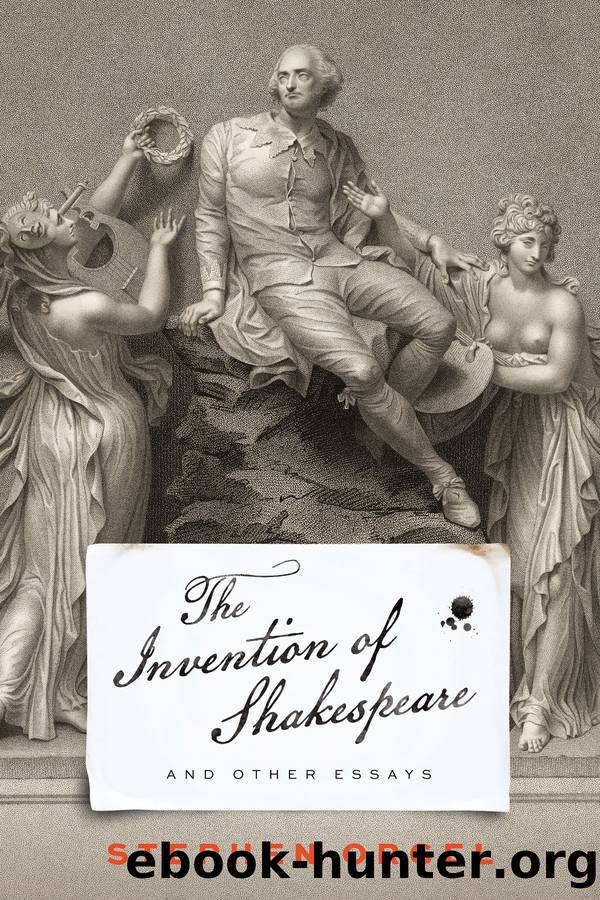The Invention of Shakespeare, and Other Essays by Stephen Orgel;

Author:Stephen Orgel;
Language: eng
Format: epub
ISBN: 9780812298369
Publisher: Lightning Source Inc. (Tier 2)
Published: 2022-01-25T00:00:00+00:00
8
Food for Thought
The banquet scene in The Tempest is one of a number of evocations of The Aeneid that re-enact the events of the crucial European epic of empire. Many of these allusions are ironic or subversive: the Neapolitans returning from Tunis argue over whether it is the ancient Carthage, and invoking âwidow Didoâ they implicitly declare Virgilâs Dido a fiction; and Prospero, near the playâs conclusion ventriloquizing Ovidâs Medea, articulates the playâs celebration of the power of metamorphosis and storytelling, as against conquest and dynastic rule. In Virgil, the shipwreck victimsâ banquet is immediately attacked by harpies, who render the food inedible. In Shakespeare the harpy is Ariel, and what he delivers to the hungry Neapolitans is only memory, couched in the severest moral terms. This is Prosperoâs banquet, revenge eaten cold. But the scene is also one of the most elaborate theatrical spectacles in the play, food for the eye, not at all disappointing or delusory for an audience.
Literary banquets more often than not include unpleasant surprisesâthe surprise is generally the point of the feast, as in The Tempest, tragic for the characters, but for audiences a satisfying climax to a theatrical meal. The chief classic models are the banquet Tantalus serves the gods, at which the meat is the body of his son Pelops; and the meal Pelopsâs son Atreus prepares for his brother Thyestes, at which Thyestes is served the bodies of his sons. The Atreus scene is refigured, rather perfunctorily, as the concluding act of vengeance in Titus Andronicusâperfunctorily precisely because the scene was a classic, and an educated Elizabethan audience already knew what Saturninus and Tamora were eating; moreover, for anyone without a classical education, Titus spells out his plan in advance. Feasts ending badly are also imperial foundation myths, like the feast offered by Romulus to his neighbors across the Tiber, which concluded, as it was intended to do, with the abduction of the Sabine women to populate the new empire.
Shakespearean dinners especially are rarely comforting and convivial. The meal offered by Petruchio to his bride on their honeymoon is a cruel tease, with course after course rejected over the protests of the starving Kate. The banquet prepared by Macbeth and Lady Macbeth for the visiting Duncan is served offstage, an ironically festive background for a scene in which the hosts plan the murder of their guest; and at a subsequent banquet Macbeth is crowded out of his own table by the ghost of the murdered (and aptly named) Banquo. Antony and Cleopatra spar over who should invite whom to dinner; and then Antony, the guest, loses his appetite for anything except the sight of Cleopatraâthe point of this banquet, obviously, was never the food. Timon of Athens belittles his feastââthere is an idle banquet attends youââbut then entertains his guests so lavishly that it is clear none of them will be able to reciprocate, or will wish to, or, when he is destitute, do. Capulet similarly unknowingly prepares his own downfall with
Download
This site does not store any files on its server. We only index and link to content provided by other sites. Please contact the content providers to delete copyright contents if any and email us, we'll remove relevant links or contents immediately.
The Power of Myth by Joseph Campbell & Bill Moyers(1057)
Half Moon Bay by Jonathan Kellerman & Jesse Kellerman(979)
Inseparable by Emma Donoghue(976)
A Social History of the Media by Peter Burke & Peter Burke(973)
The Nets of Modernism: Henry James, Virginia Woolf, James Joyce, and Sigmund Freud by Maud Ellmann(891)
The Spike by Mark Humphries;(809)
The Complete Correspondence 1928-1940 by Theodor W. Adorno & Walter Benjamin(782)
A Theory of Narrative Drawing by Simon Grennan(774)
Culture by Terry Eagleton(770)
Ideology by Eagleton Terry;(731)
World Philology by(712)
Farnsworth's Classical English Rhetoric by Ward Farnsworth(711)
Bodies from the Library 3 by Tony Medawar(707)
Game of Thrones and Philosophy by William Irwin(707)
High Albania by M. Edith Durham(698)
Adam Smith by Jonathan Conlin(686)
A Reader’s Companion to J. D. Salinger’s The Catcher in the Rye by Peter Beidler(675)
Comic Genius: Portraits of Funny People by(649)
Monkey King by Wu Cheng'en(646)
